Wisconsin college students faced mounting mental health challenges during COVID. Now they're ready to talk about it.
If you or someone you know is struggling or in crisis, call or text the National Suicide Prevention Lifeline at 988 or text “HOPELINE” to the National Crisis Text Line at 741741.
Katherine Zimmerman had a very good problem on her hands.
So many students showed up for the September kickoff meeting of an organization she leads that she had to move attendees to a larger room on the University of Wisconsin-Madison campus.
That's not surprising for a school bursting at the seams. But the turnout was unexpected, given the group's focus on a topic long treated as taboo: mental health.
More: The state of mental health across UW System in 4 charts
"It was a feeling of awe to see so many UW students wanting to be involved and passionate about mental health," said Zimmerman, a senior studying psychology and sociology who grew up in Hartland. "Students kept flowing into the room, and a long line began to form all the way down the hall."
In recent years, Zimmerman said, the first meeting of the UW-Madison chapter of the National Alliance on Mental Illness drew about 30 students. But this year, 110 filed into the meeting room.
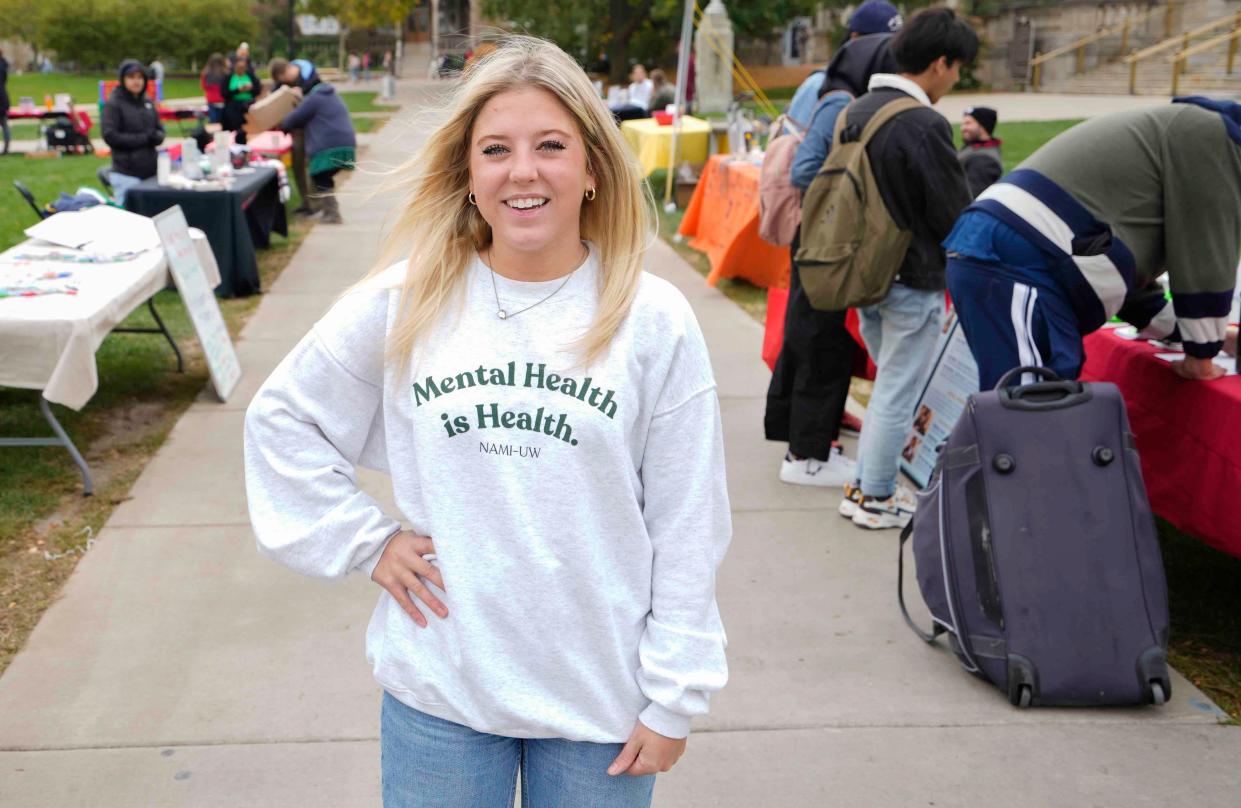
It speaks to how deeply college students are clamoring to have a conversation about mental health. After muddling through a pandemic, losing out on learning and social experiences, facing financial stress and health scares, many students are increasingly open about their own struggles.
This reporting is part of our Kids in Crisis series, which is examining students' experiences as they face historically high mental health problems.
For college students, rates of anxiety, depression and suicidal ideation were on the rise even before COVID-19, according to a host of national studies, data from Wisconsin schools and interviews with college counselors. The pandemic only piled on, causing a spike in situational stress and more students seeking help in how to manage it.
Stigma surrounding mental health was waning on college campuses long before COVID-19. But some counselors and many students said awareness and acceptance has accelerated, in large part because of what young adults have endured over the last four years.
For Zimmerman, the transition to college in fall 2020 was tough. Online classes exhausted her. She wasn't connecting with professors or peers. Social anxiety and bouts of depression clouded much of her freshman year.
"I think the pandemic really put into perspective the importance of managing your mental health," she said. "I never really thought of myself as someone who needed help. So it taught me a lesson that you don’t have to be alone. You can be vulnerable and get support, and you’re not alone in what you’re going through."
More students reporting social anxiety in wake of pandemic
Mason Jacobs, a junior studying social work at Concordia University Wisconsin, considered himself an outgoing person unafraid to chat up strangers. But after COVID-19 hit, he felt his confidence plummet.
"I wouldn't consider myself shy at all, but I take a little time to warm up to people now," he said.
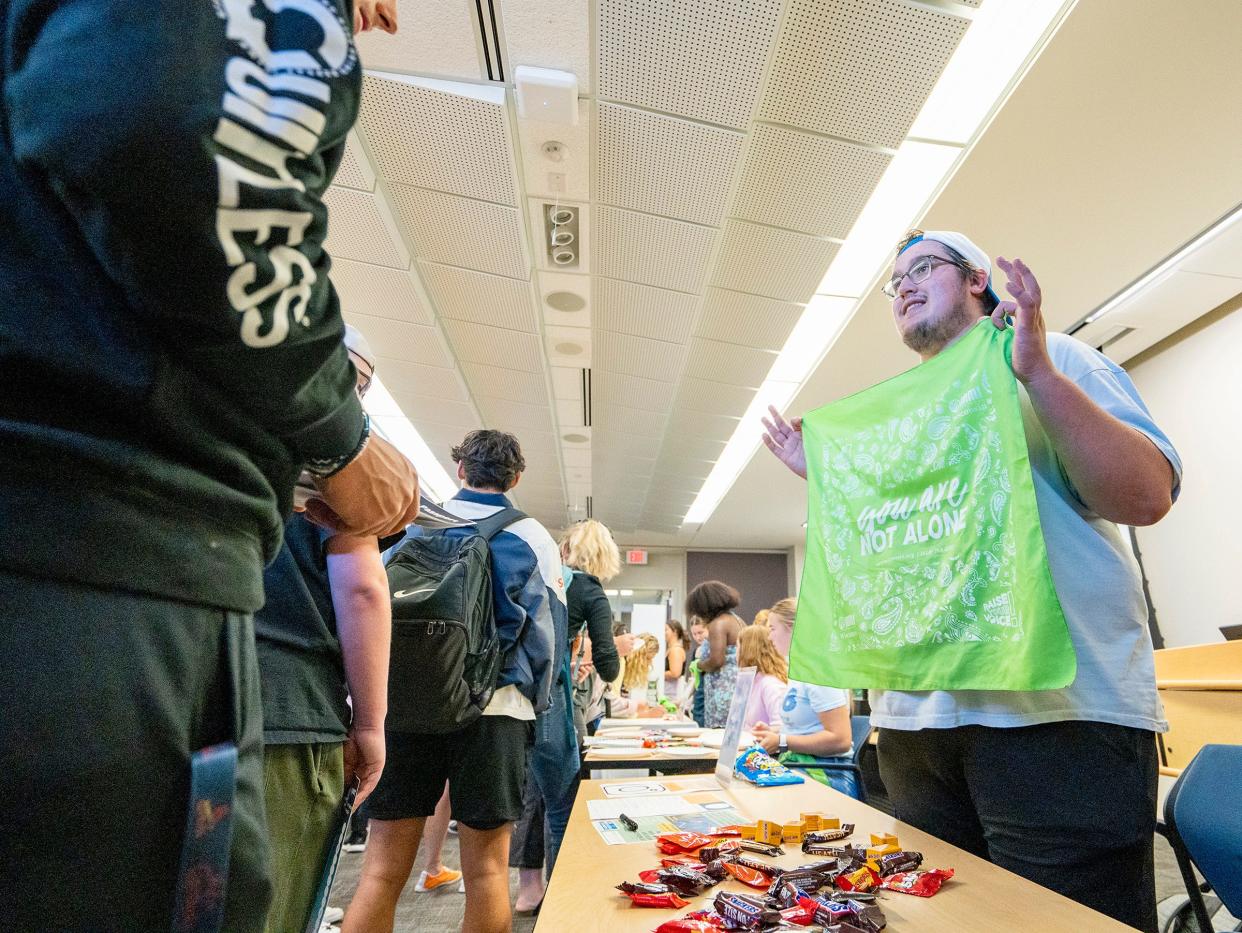
As COVID-19 recedes, college counselors say they are hearing more students talk about social anxiety.
That makes sense to Jodi Blahnik, assistant director of the Marquette University Counseling Center. Consider the intense disruptions of 2020 and 2021. Student development and psychological maturity may have paused during this time — an observation Blahnik's heard from K-12 teachers, too.
"Middle schoolers came in as fourth-graders; freshmen came in as sixth- or seventh-graders," she said. "They lost that normal development that comes with experiencing all those milestones."
Joining a peer support group has helped Jacobs develop interpersonal skills in a small group setting. Some weeks, the group works through mental health-related exercises, like word-affirmation Jenga. But other weeks, the group participates in normal college activities, like grabbing tacos together off campus.
More: The state of mental health across Wisconsin's public universities in 4 charts
Another Concordia student, Sydney Kalk, realized there weren't peer support groups specifically for graduate students like herself. So she organized her own.
“A counselor can tell you you’re not alone a million times," she said. "But when you’re hearing from someone else going through the same thing, it can be helpful, and it can be powerful."
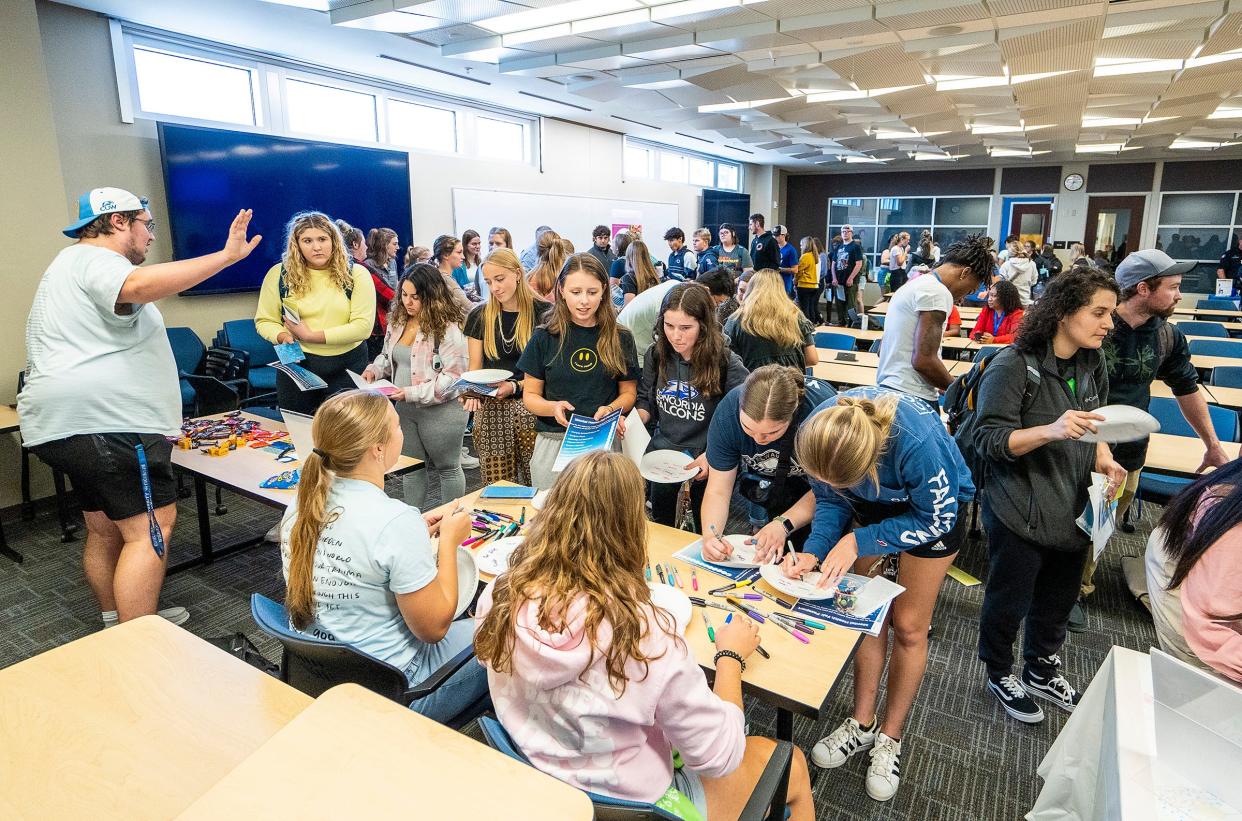
Another way Concordia has helped students regain confidence is through "awkward zone" workshops where they practice having uncomfortable conversations.
Rebecca Hasbani, a Concordia counseling intake and triage coordinator, leads the sessions and often starts by telling students about her brother. He was diagnosed with cancer at 19; his friends, having no clue how to respond, just avoided the topic.
"I use that in my training as an example of how sometimes we want to be there for someone, but we don’t know how," she said. "And so the 'awkward zone' provides realistic and just simple ways that you can reach out and make somebody know that you care."
At UW-River Falls, a student reaches out to a struggling peer
UW-River Falls student Brandi Weiland's mental health nosedived in the spring 2020 semester — but it had little to do with COVID-19.
A sophomore at the time, Weiland felt boxed into a major she didn't want to pursue. She had just been diagnosed with lupus, a chronic disease causing severe joint pain, fever and fatigue for which there is no cure. In addition, Weiland's only sibling, a brother with special needs, died.
Throughout her junior and senior year, Weiland began entertaining suicidal thoughts and developing a plan. She also started seeing a campus counselor.
Weiland confided in a friend at the cafeteria one day. She bawled in a booth when a stranger kneeled down at her table.
"She told me I was worthy, and I was loved, and I didn't want to do this," Weiland recalled. "Friends and family kind of have to tell you that. But hearing that from a stranger, I thought maybe I am loved. Maybe I'm not a burden."
UW-River Falls helped connect her with a community counselor and approved having an emotional support cat, Tiger, live with her on campus. She switched her major to stage and screen arts, and expects to graduate next spring.
Weiland's story illustrates the importance of counseling centers receiving enough resources to help students in crisis. It also highlights how other students can play a critical role in creating a caring culture on campus.
Weiland still struggles with depression but said she no longer has suicidal thoughts. She hasn't found the stranger who showed her kindness when she most needed it.
"Honestly, I wish I could find this girl and tell her thank you," Weiland said.
Suicide risk indicators on the rise among UW system students
Attending college tends to have a protective factor against suicide, with experts pointing to studies showing college students are less likely to die by suicide than their nonstudent peers.
Still, it's important to remember suicide is one of the leading causes of death among college students. A substantial number of them — about one in four students, according to a 2022 survey by the American College Health Association — experience suicide-related thoughts and behaviors.
At UW-River Falls, three students recently died. Their obituaries said they all lost their battles with depression, Minnesota Public Radio reported. The university extended Thanksgiving break to a full week to give students more time to recover.
At UW-Madison, a student last spring died in a public place outside a dorm densely inhabited by students, some of whom witnessed the traumatic death. The Dane County Medical Examiner's Office hasn't yet ruled whether the March 27 death was a suicide.
"It was a campus-wide tragedy," said Zimmerman, the UW-Madison student who leads the university's National Alliance on Mental Illness chapter. "But I also think there was power in it."
Zimmerman saw the campus come together, united around the importance of mental health. Professors brought it up in her classes. A couple hundred students emailed, texted or messaged the NAMI chapter seeking help or offering to lend a hand of their own.
"Stigma kills," she said. "It silences people. It isolates them. In the wake of that event, my sense was students were more open to talking about (mental health)."
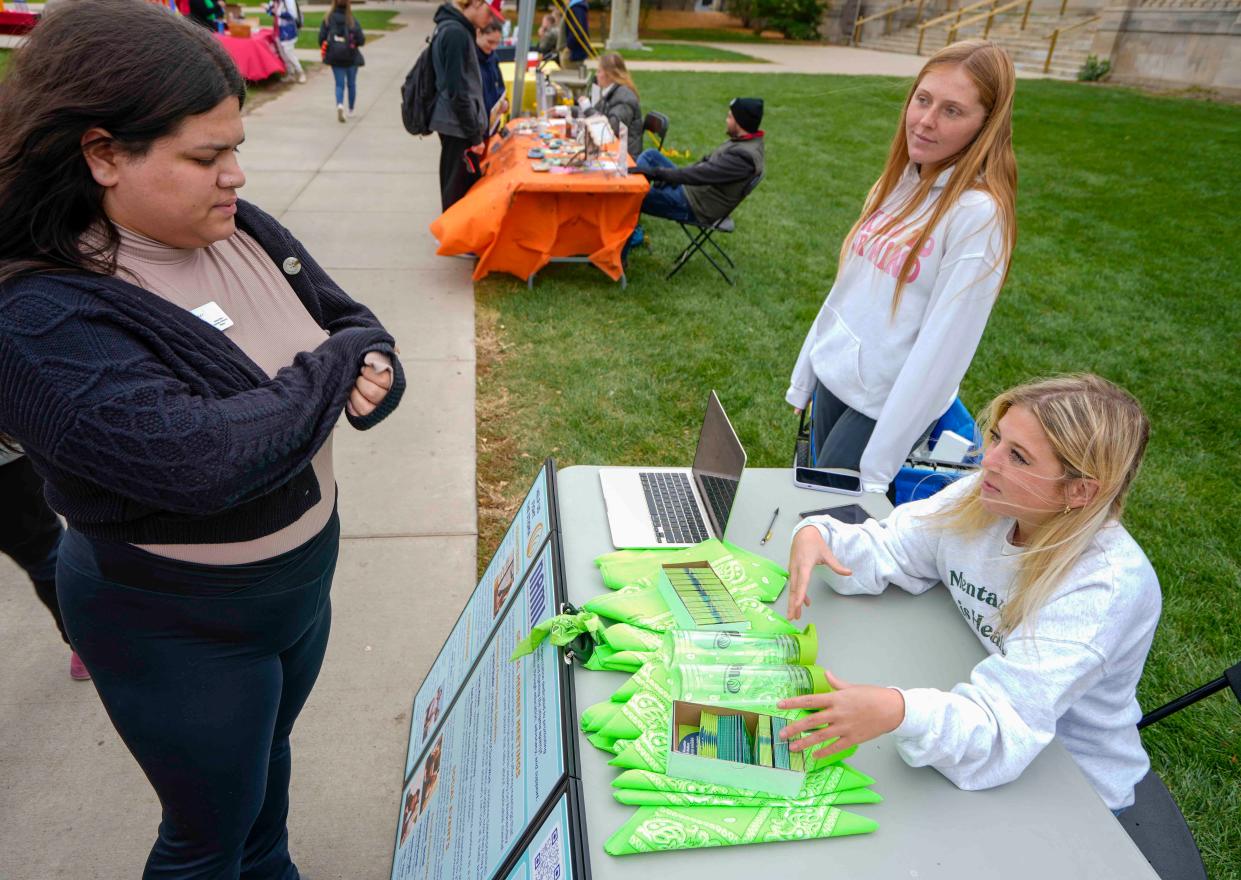
The level of candor on campus has made a remarkable shift from nearly a decade ago, said Taylor Iwaszko, a 2017 UW-Madison graduate. She became involved in the university's NAMI chapter in 2014 after losing two friends to suicide in high school.
Iwaszko remembers hosting campus outreach events that drew few attendees and manning booths where students wouldn't make eye contact. Some of it was busy college students going about their day, but Iwaszko said there were many instances where the topic itself clearly drove people away.
"We definitely were kind of a bull in a china shop in some ways," she said. "Our goal was to talk about it and make it easier to be a part of normal conversations. I felt like there was an acknowledgment about the importance of it at that time but an unwillingness to talk about it."
New meditation spaces and 'nap pods' among array of stress management tools
As students embrace a broader culture of wellbeing, they are also pressing for more tools to keep their mental health in check.
Colleges are contracting with telehealth providers, adding trainings and increasing awareness of existing resources.
In a first for Concordia, the school devoted an entire week earlier this semester to mental health and suicide prevention activities. Some faculty canceled classes, requiring students to instead participate in Mental Health Week events to earn participation points.
UW-Madison hosted an inaugural mental wellbeing resource fair earlier this fall. UW-Milwaukee debuted a wellness symposium event in September.
"This is the new normal, so we need to think creatively and more holistically about how we manage the challenges of mental health in a culture and society that is constantly being bombarded with things that can make you anxious," said UW-Milwaukee counseling director Carrie Fleider.
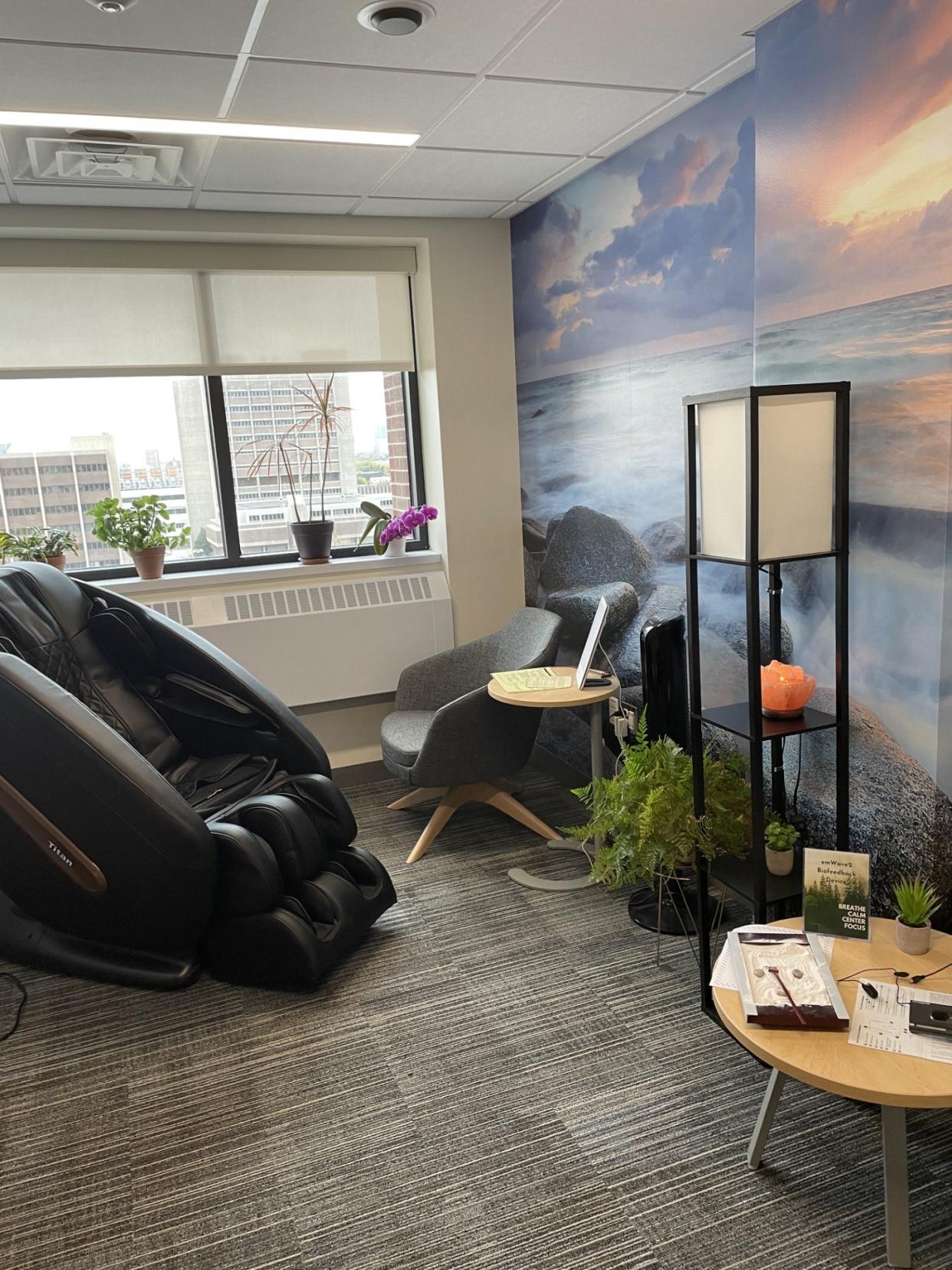
Some of the more visible efforts schools have made are the opening of meditation spaces.
UW-Milwaukee's new "mindful space" has massage chairs, plants and therapy lamps. Students can slip on virtual reality googles to take a pretend walk on the beach.
A "Rejuvenation Room" in UW-Madison's new recreation and wellness building includes "nap-pods."
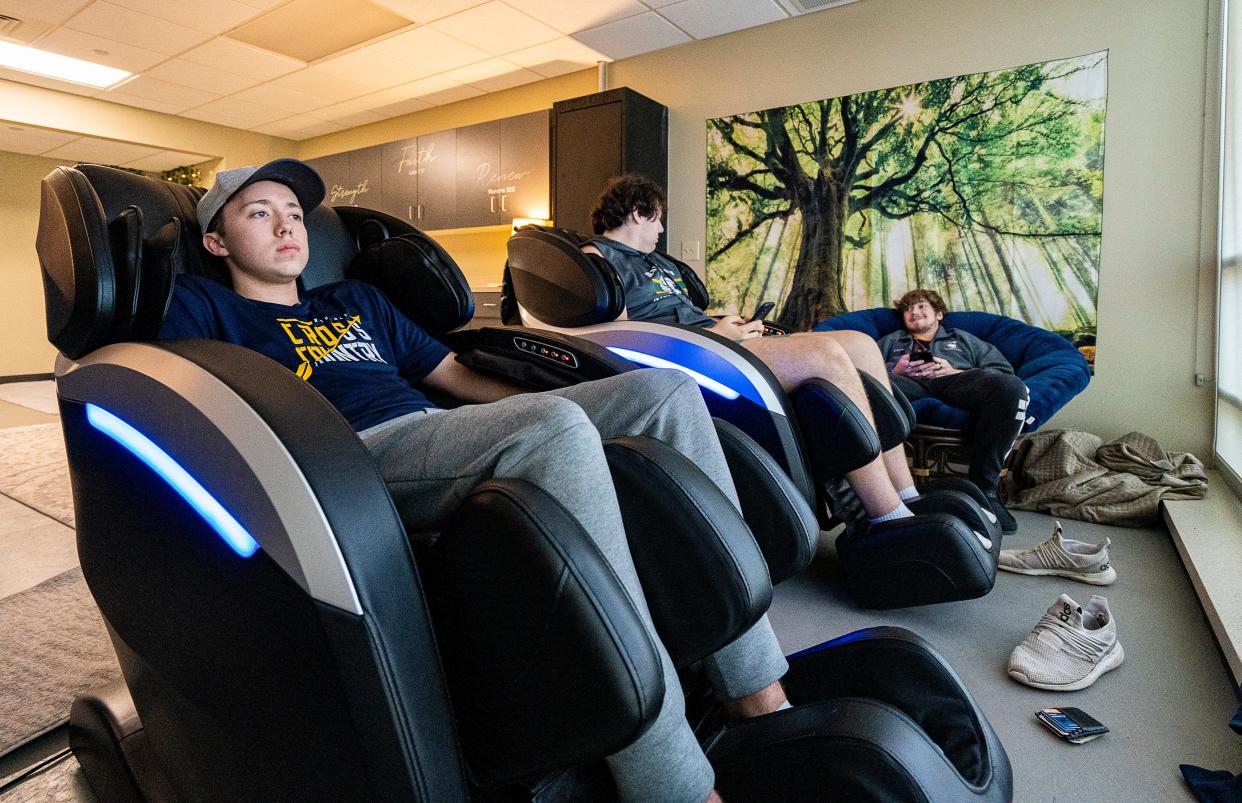
Concordia created a quiet room with dim lighting, weighted blankets and a Stress Management and Resiliency Training (SMART) lab tool that teaches breathing techniques.
Concordia senior KaiJay Jiles has stopped by when she's stressed. Mental health during college has been “an emotional rollercoaster, and sometimes I feel like I’m still on it," she said.
Jiles didn't sign up for campus counseling, in part because she's found her own community of support through the Black Student Union and and the Multicultural Office. She tried off-campus counseling, but it didn't help much.
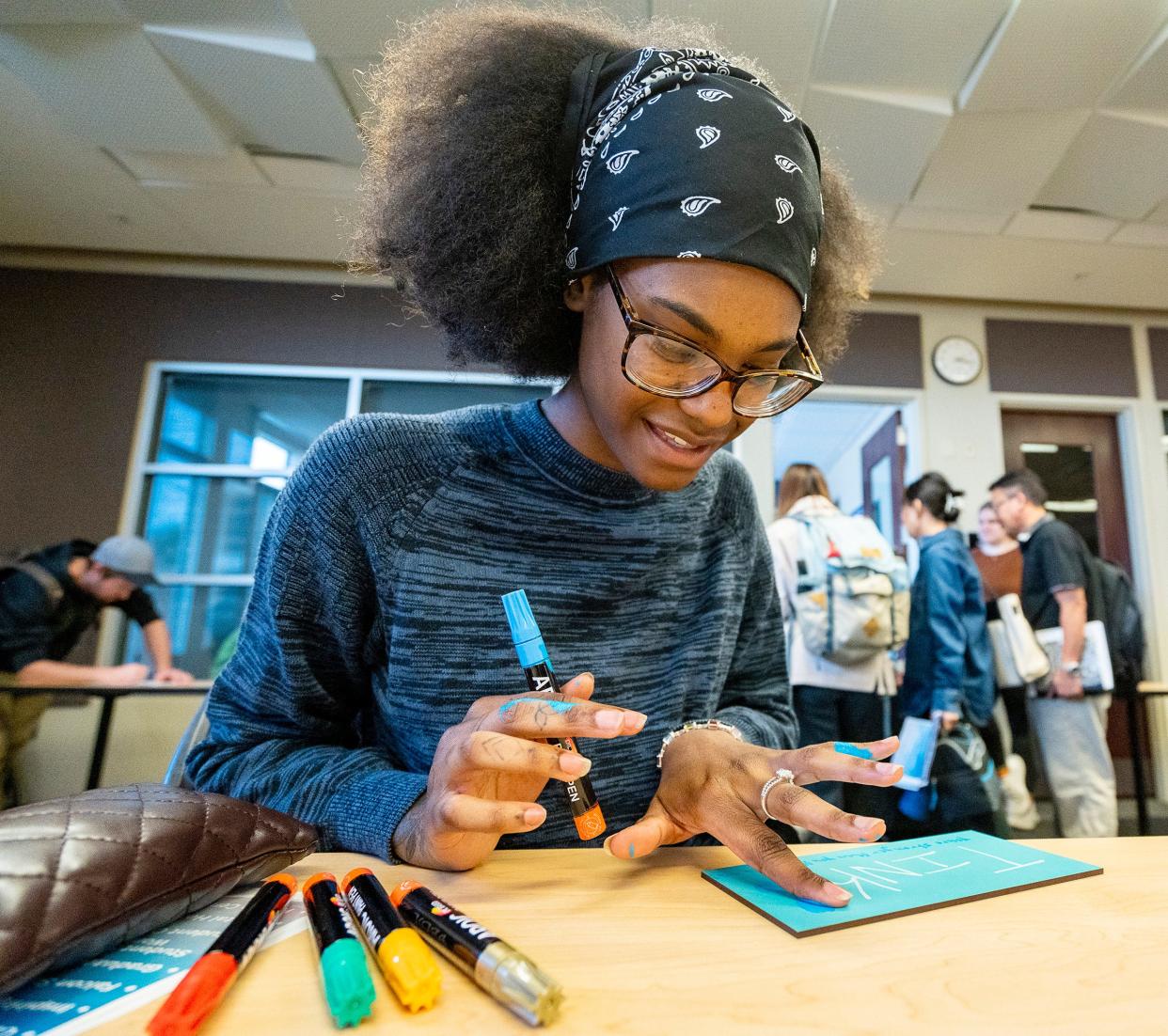
What works?
"I'm still trying to figure that out," she admitted.
At a campus mental health fair, Jiles painted a sign for a high school friend struggling with loneliness. She scrawled a message she hoped would be helpful: "You're stronger than you think you are."
Contact Kelly Meyerhofer at kmeyerhofer@gannett.com. Follow her on Twitter at @KellyMeyerhofer.
This article originally appeared on Milwaukee Journal Sentinel: Wisconsin college students increasingly open about mental health
